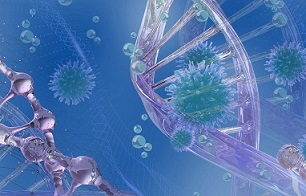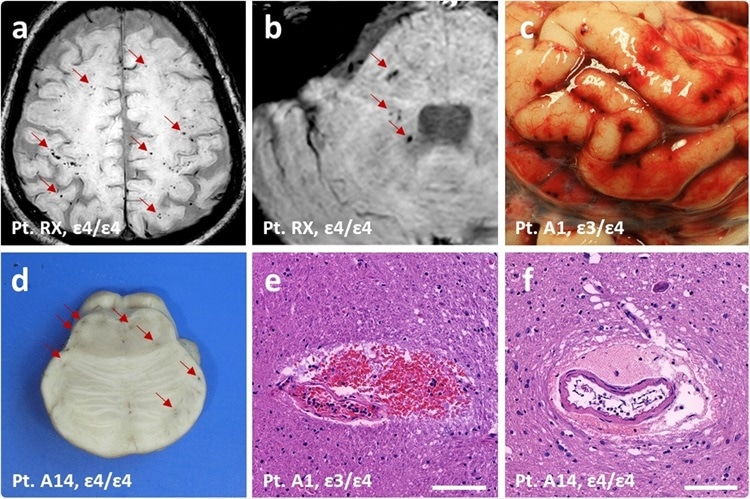University Of Helsinki Study Shows APOE4 Allele Gene More Than Doubles Risk Of Severe COVID-19 Besides Increasing COVID-19 Cerebral Microhemorrhages!
APOE4-COVID-19: Researchers from the University of Helsinki-Finland have discovered in a new study that the APOE4 allele gene more than doubles risk of severe COVID-19 besides increasing cerebral microhemorrhages related to COVID-19.
 Have A Heart And Do Not Ignore This Appeal For Help! Please help support this website and also our research and community initiatives by making a donation. Your help saves lives directly and indirectly. Thank You.
https://www.thailandmedical.news/p/sponsorship
Have A Heart And Do Not Ignore This Appeal For Help! Please help support this website and also our research and community initiatives by making a donation. Your help saves lives directly and indirectly. Thank You.
https://www.thailandmedical.news/p/sponsorship
The study team also found that gene is also associate with mental fatigue related to long COVID or PASC (Post-acute Sequelae of COVID-19).
The Apolipoprotein E ε4 allele (APOE4) has been shown to associate with increased susceptibility to SARS-CoV-2 infection and COVID-19 mortality in some previous genetic studies, but information on the role of APOE4 on the underlying pathology and parallel clinical manifestations is scarce.
The research team studied the genetic association between APOE and COVID-19 in Finnish biobank, autopsy and prospective clinical cohort datasets. In line with previous work, the data on 2611 cases showed that APOE4 carriership associates with severe COVID-19 in intensive care patients compared with non-infected population controls after matching for age, sex and cardiovascular disease status.
In addition, histopathological examination of brain autopsy material of 21 COVID-19 cases provided evidence that perivascular microhaemorrhages are more prevalent in APOE4 carriers.
The study team’s analysis of post-COVID fatigue in a prospective clinical cohort of 156 subjects revealed that APOE4 carriership independently associates with higher mental fatigue compared to non-carriers at six months after initial illness.
The study findings suggest that APOE4 is a risk factor for severe COVID-19 and post-COVID mental fatigue and provides the first indication that some of this effect could be mediated via increased cerebrovascular damage. Further studies in larger cohorts and animal models are warranted.
The study findings were published in the peer reviewed journal: Acta Neuropathologica Communications (Springer)
https://actaneurocomms.biomedcentral.com/articles/10.1186/s40478-021-01302-7
Approximately one-third of Finns carry the APOE4 allele, a genetic variant that predisposes carriers to Alzheimer's disease.
Worldwide, about 25% of people carry one copy of APOE4, and 2 to 3% carry two copies. APOE4 is the strongest risk factor gene for Alzheimer’s disease, although inheriting
APOE4 does not mean a person will definitely develop the disease.
Numerous past studies have reported observations
that show a link between APOE4 and COVID-19, both in terms of increased susceptibility to SARS-CoV-2 infection and COVID-19 mortality.
https://academic.oup.com/biomedgerontology/article/75/9/1801/5867501?login=true
https://academic.oup.com/biomedgerontology/article/75/11/2231/5843454?login=true
https://www.ncbi.nlm.nih.gov/pmc/articles/PMC8247822/
https://www.sciencedirect.com/science/article/pii/S1567134821003415
https://www.karger.com/Article/Abstract/513182
https://academic.oup.com/biomedgerontology/advance-article/doi/10.1093/gerona/glab184/6309638?login=true
The study team investigated the link between the APOE4 allele and the severity of COVID-19 in the Finnish population.
The Finnish multidisciplinary group also investigated microscopic cerebral changes in cadavers who had suffered from COVID-19, as well as the link between APOE4 and symptoms of mental fatigue, experienced six months after the onset of the disease.
 Microvascular brain haemorrhages in RECOVID and AUTOPSY cohorts. an MRI showing cortical microhemorrhages in a case with APOE ε4/ε4. b MRI showing cerebellopontine microhaemorrhages in the same case as (a). c Brain subarachnoidal microhaemorrhages at autopsy in a case with APOE ε3/ε4. d Brain pontine microhemorrhages at neuropathological examination in a case with APOE ε4/ε4. e Histological H&E section showing pontine microhaemorrhages in the same case as (c). f Histological H&E section showing pontine microhaemorrhages in the same case as (d). Red arrows indicate microhemorrhages. Scale bars represent 100 μm in (e) and (f)
Microvascular brain haemorrhages in RECOVID and AUTOPSY cohorts. an MRI showing cortical microhemorrhages in a case with APOE ε4/ε4. b MRI showing cerebellopontine microhaemorrhages in the same case as (a). c Brain subarachnoidal microhaemorrhages at autopsy in a case with APOE ε3/ε4. d Brain pontine microhemorrhages at neuropathological examination in a case with APOE ε4/ε4. e Histological H&E section showing pontine microhaemorrhages in the same case as (c). f Histological H&E section showing pontine microhaemorrhages in the same case as (d). Red arrows indicate microhemorrhages. Scale bars represent 100 μm in (e) and (f)
Corresponding author, Dr Liisa Myllykangas, a consultant neuropathologist from the University of Helsinki and Helsinki University Hospital told Thailand
Medical News, “The common ε4 allele of the APOE gene appears to be associated with a heightened risk of severe COVID-19 in the Finnish population. The significance of APOE4 is emphasized in the Finnish population, which may be due to its genetic homogeneity."
The APOE4-COVID-19 study findings show the risk of developing a form of COVID-19 that requires intensive care more than doubled in carriers of the APOE4 allele.
Furthermore, more microscopic hemorrhages were found in the brain as a result of severe COVID-19 in the study among carriers of this allele, compared to others.
Chief Physician, intensivist Dr Johanna Hästbacka University of Helsinki and Helsinki University Hospital says that APOE4 may also affect the severity of certain long-term symptoms, especially in cases of COVID-19 that require hospitalization.
Dr Hästbacka added, "In the study, mental fatigue, which was defined as difficulty in directing attention and concentrating, emerged as one such symptom.”
Dr Myllykangas points out that, in the datasets now studied, the number of COVID-19 patients was relatively small, and the results must at this point be considered indicative.
She added, "To ascertain our findings, these phenomena must be investigated in larger datasets.”
A critical question not answered in the study is the connection between COVID-19 and the onset of memory disorders in APOE4 carriers.
Dr Myllykangas said, "To answer this question, long-term follow-up studies on patients recovered from COVID-19 are needed, as is basic research focused on the combined effects of APOE4 and systemic inflammation on the mechanisms of memory in the brain. Our research group has already launched these lines of further research at the University of Helsinki and Helsinki University Hospital.
The research used clinical data from the FinnGen project that combines genome data produced from biobank samples with health data compiled from national registries. The results are based on data concerning more than 46,000 individuals, of whom over 2,600 had been diagnosed with COVID-19. In addition, tissue specimens collected from 21 deceased individuals who had suffered from COVID-19 were included in the study for the purpose of investigating microscopic changes in the brain.
In order to investigate mental fatigue symptoms, the researchers utilized the RECOVID dataset in which patients were divided into three groups on the basis of disease severity. The dataset also included a healthy control group. In all, the RECOVID dataset comprised 156 study subjects.
Have A Heart And Do Not Ignore This Appeal For Help! Please help support this website and also our research and community initiatives by making a donation. Your help saves lives directly and indirectly. Thank You.
https://www.thailandmedical.news/p/sponsorship
For more about
APOE4-COVID-19, keep on logging to Thailand Medical News.

 Microvascular brain haemorrhages in RECOVID and AUTOPSY cohorts. an MRI showing cortical microhemorrhages in a case with APOE ε4/ε4. b MRI showing cerebellopontine microhaemorrhages in the same case as (a). c Brain subarachnoidal microhaemorrhages at autopsy in a case with APOE ε3/ε4. d Brain pontine microhemorrhages at neuropathological examination in a case with APOE ε4/ε4. e Histological H&E section showing pontine microhaemorrhages in the same case as (c). f Histological H&E section showing pontine microhaemorrhages in the same case as (d). Red arrows indicate microhemorrhages. Scale bars represent 100 μm in (e) and (f)
Microvascular brain haemorrhages in RECOVID and AUTOPSY cohorts. an MRI showing cortical microhemorrhages in a case with APOE ε4/ε4. b MRI showing cerebellopontine microhaemorrhages in the same case as (a). c Brain subarachnoidal microhaemorrhages at autopsy in a case with APOE ε3/ε4. d Brain pontine microhemorrhages at neuropathological examination in a case with APOE ε4/ε4. e Histological H&E section showing pontine microhaemorrhages in the same case as (c). f Histological H&E section showing pontine microhaemorrhages in the same case as (d). Red arrows indicate microhemorrhages. Scale bars represent 100 μm in (e) and (f)